Rusia/Septiembre de 2017/Autor: Aleksander Shakirov/Fuente: Real Noevrenya
Resumen: El 1 de septiembre, el proyecto comenzó en cuatro municipios de la provincia de Sverdlovsk, incluyendo Ekaterimburgo y Nizhny Tagil. Como director general de NCEO Konstantin Kozlov informó a RBK, el proyecto cubrirá 350 grupos-participantes (más de 10.000 estudiantes de la escuela) y más de 700 maestros. En el marco del programa, la NCEO planea distribuir 8.000 tabletas, que están destinadas a sustituir todos los libros de texto de los estudiantes, incluidos libros y libros. La tableta se hace en forma de un libro. Una pantalla es usual, la otra es de papel electrónico. En la pantalla en color, los alumnos verán diferentes presentaciones, videos y otros archivos multimedia. La pantalla con papel electrónico no es perjudicial para la visión del niño, Kozlov señaló.
The national centre of electronic education (controlled by Rostec) launches a pilot project for equipping schools in Sverdlovsk Oblast with dual-screen tablets. The projects will concern more than 10,000 pupils and can become another step in transferring of school education to digital format. Its creators plan to introduce tablets nation-wide. However, it is predictably faces the financial problem. Read the details in the material of Realnoe Vremya.
1,5 kilos of technologies
On 1 September, the project started in four municipalities of Sverdlovsk Oblast, including Yekaterinburg and Nizhny Tagil. As director general of NCEO Konstantin Kozlov reported to RBK, the project will cover 350 groups-participants (more than 10,000 school students) and more than 700 teachers. In the framework of the programme, the NCEO plans to give out 8,000 tablets, which are intended to substitute all student textbooks, including workbooks and books.
The tablet is made in the form of a book. One screen is usual, the other is of electronic paper. On the colour screen, the pupils will watch different presentations, videos and other media files. The display with electronic paper is not harmful for child vision, Kozlov noted.
The tablet operates on Android, the weight is 1,5 kilos, the size of each screen is 10 inches. The creators plan to reduce the weight of the device. The NCEO has already spent 300 million of own funds for the pilot project realisation. In the framework of the project, it is also planned to monitor important indicators (progress in studies, readiness of teachers to new introductions and so on), after which there may appear a model of electronic education building that will cover all the regions of Russia.
The Russian development of Chinese production
The assembly of the tablet was conducted in the Chinese plant Foxconn, the world largest contract producer of electronics (in particular, they assemble iPhone, iPad, Amazon Kindle, Nintendo and Xbox). The NCEO highlights that the school tablets is the Russian development, its serial production will be on the industrial capacities of Rostec.
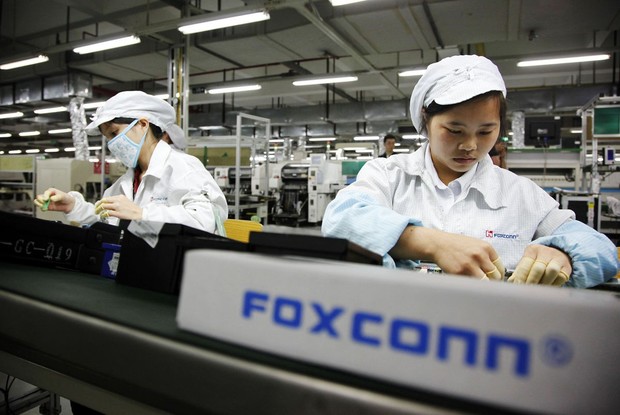
The assembly of the tablet was conducted in the Chinese plant Foxconn. Photo: vistanews.ru
The device is estimated at more than 30,000 rubles. In the future it will cost less than 20,000 rubles. »Two thousand rubles is not the price of educational tablet that will allow to implement them widely in schools,» believes chief analyst at Mobile Research Group Eldar Murtazin. »For such price it is possible to buy even a computer. What is more, it has more advantages,» said Murtazin to RBK. For the same reason, the initiative won’t be interesting for the Ministry of Education, Murtazin believes. »Besides, the concept of dual screen proved itself to be unsuccessful,» said the expert.
The head of the project HalalGuide Ayrat Kasimov holds the opposite point of view. According to him, the future belongs to such projects:
»We ourselves go to work only with a smartphone, not a pack of books. These tablets, as I understand it, have LED screens, that means that they are not harmful for children vision and will be a perfect solution,» told Kasimov to Realnoe Vremya. »I think it is acceptable to pay 30,000 rubles once in 11 years of education. If only the tablets have a guarantee for the whole period of education. I think, all expenditures for the purchase of tablets will eventually fall on the shoulders of parents anyway. Not all families, especially with many children, can afford it. But in general, I am for such introductions – the educational process will go faster. At the same time, it is important for children to develop motor skills. Perhaps, additionally they should introduce some lessons of sculpting to compensate the time children work with tablets.»
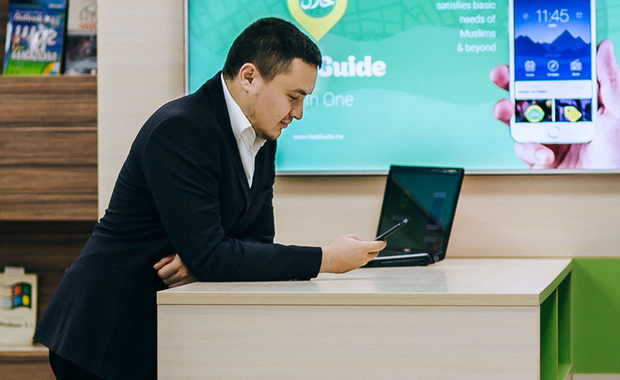
According to Ayrat Kasimov, the future belongs to such projects. Photo: incrussia.ru
The only problem is money
»From the point of view of the price for the tablet, it is quite adequate,» said director of IT park Anton Grachyov, who commented on the news to Realnoe Vremya. »Personally I saw the prototype of the tablet two years ago. The question is in other: will the regional and federal ministries of education have money for this? Or municipalities. I think every municipality will define itself if they have money for it. But if they have federal support, then why not.»
According to the head of IT Park, the experience of the Kazan IT academy shows that children better absorb information while playing.
»This certainly will work together with an interactive board. A teacher is writing something on the board and it immediately appears on the screens of the pupils. Here it is more important not the tablet itself, but software and content,» said Grachyov.
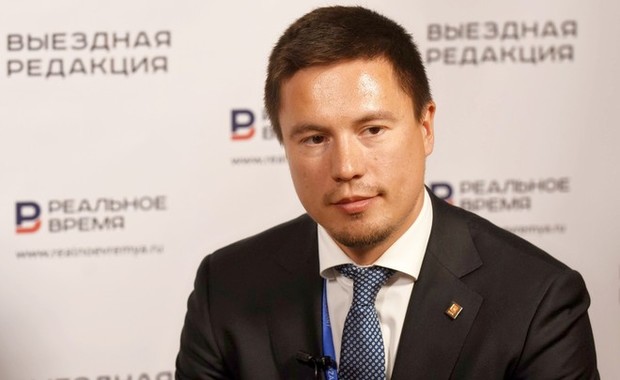
Anton Grachyov believes that this will certainly work together with an interactive board. Photo: Oleg Tikhonov
Having a choice
According to Associate Professor at the Institute of Pedagogy and Psychology of the Kazan Federal University Galina Aleksandrova, the scientific research for harmfulness of the use of tablets by students has not been conducted yet:
»Such introduction without preliminary research I consider to be wrong,» says Aleksandrova. It is a different story that these devices become a usual part of our life, and maybe it is teh reason for the idea that it is more economical. As for the comprehension of information, there is no definite answer. Many people use electronic devices and feel themselves great, other people use books. It all depends on personal preferences. I consider it wrong to introduce only one form. Every person has the right to choose the form convenient personally for them for information presentation,» told to Realnoe Vremya the associate professor.
Fuente: https://realnoevremya.com/articles/1772-some-schools-in-russia-being-equipped-with-tablets
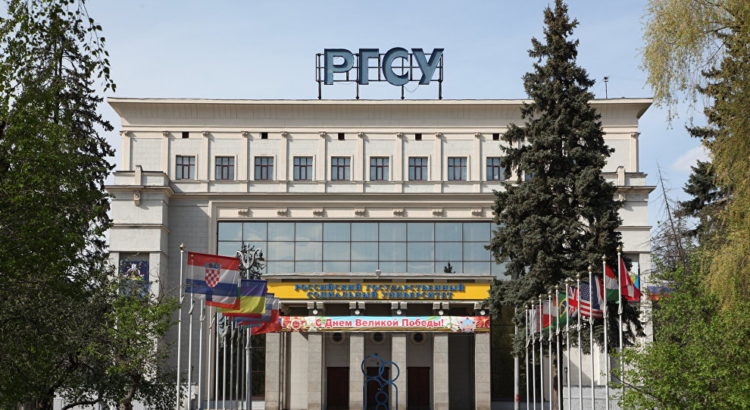

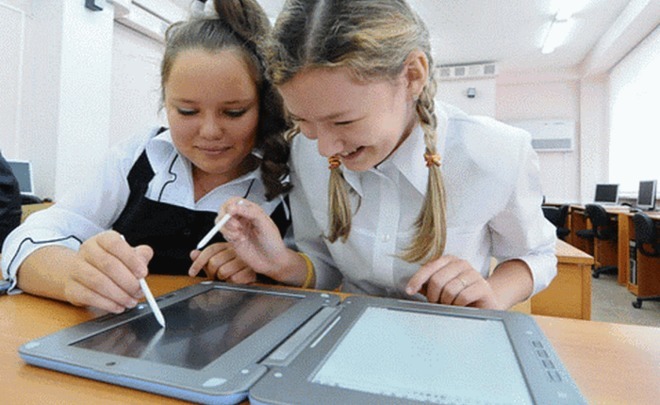



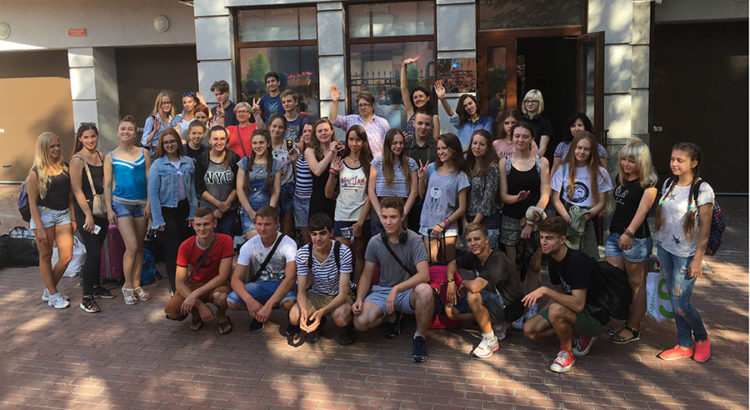
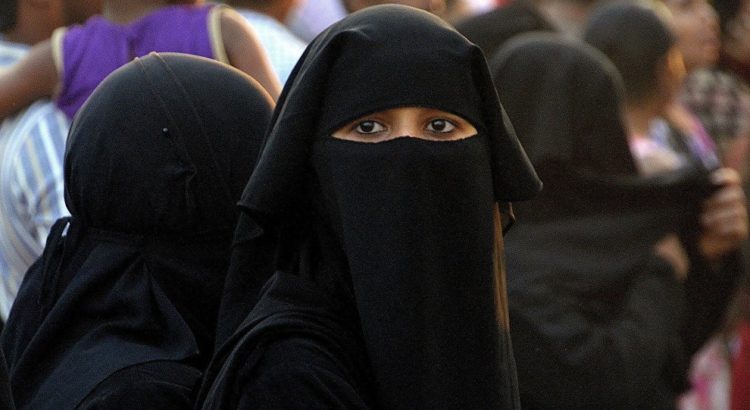











 Users Today : 84
Users Today : 84 Total Users : 35403921
Total Users : 35403921 Views Today : 98
Views Today : 98 Total views : 3333344
Total views : 3333344